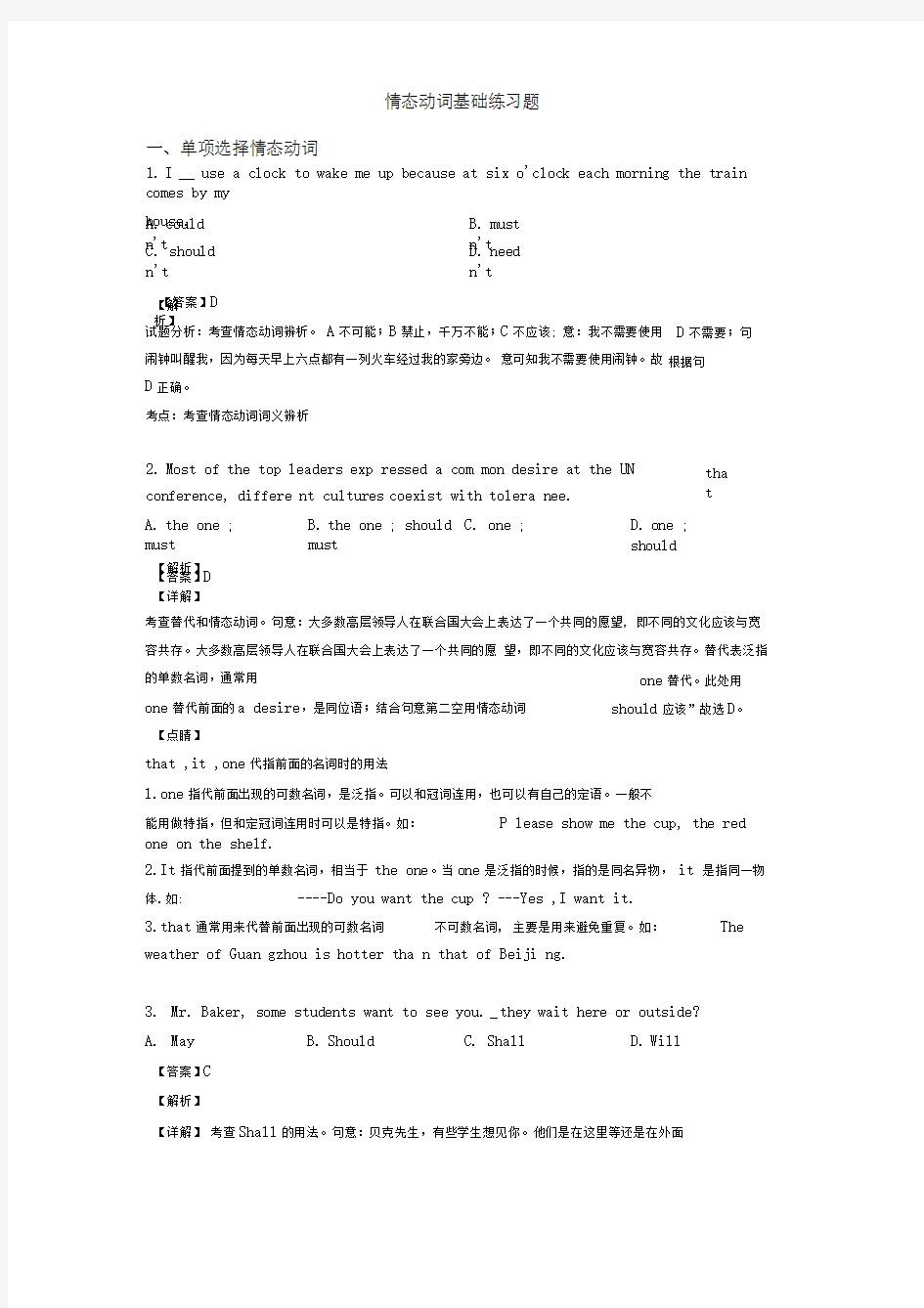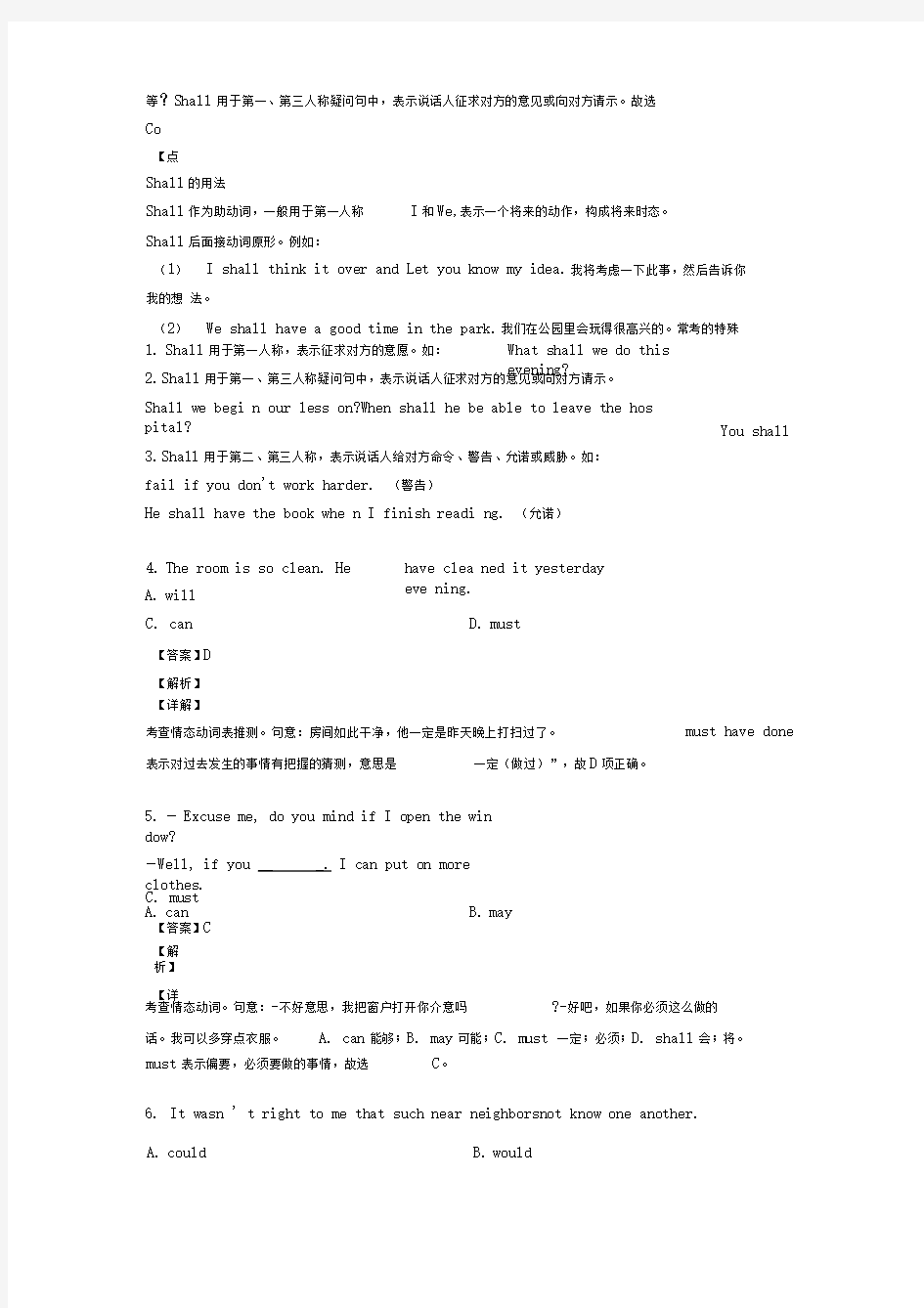

【解析】 【详解】
考查替代和情态动词。句意:大多数高层领导人在联合国大会上表达了一个共同的愿望, 即不同的文化应该与宽容共存。大多数高层领导人在联合国大会上表达了一个共同的愿 望,即不同的文化应该与宽容共存。替代表泛指的单数名词,通常用
one 替代前面的a desire ,是同位语;结合句意第二空用情态动词
【点睛】
that ,it ,one 代指前面的名词时的用法
l.one 指代前面出现的可数名词,是泛指。可以和冠词连用,也可以有自己的定语。一般不
能用做特指,但和定冠词连用时可以是特指。如:
P lease show me the cup, the red
one on the shelf.
2.It 指代前面提到的单数名词,相当于 the one 。当one 是泛指的时候,指的是同名异物, it 是指同一物
体.如:
----Do you want the cup ? ---Yes ,I want it.
3.that 通常用来代替前面出现的可数名词 不可数名词,主要是用来避免重复。如:
The
weather of Guan gzhou is hotter tha n that of Beiji ng.
3. Mr. Baker, some students want to see you. _ they wait here or outside? A. May
B . Should C. Shall D . Will
【答案】C 【解析】
【详解】 考查Shall 的用法。句意:贝克先生,有些学生想见你。他们是在这里等还是在外面
情态动词基础练习题
一、单项选择情态动词 1. I __ use a clock to wake me up because at six o'clock each morning the train comes by my house. A . could n't B . must n't C. should n't 【答案】D D . need n't 【解析】 试题分析:考查情态动词辨析。 A 不可能;B 禁止,千万不能;C 不应该; 意:我不需要使用闹钟叫醒我,因为每天早上六点都有一列火车经过我的家旁边。 意可知我不需要使用闹钟。故 D 正确。 D 不需要;句 根据句 考点:考查情态动词词义辨析
2. Most of the top leaders exp ressed a com mon desire at the UN conference, differe nt cultures coexist with tolera nee. tha
t
A . the one ; must
【答案】D B . the one ; should C. one ; must D . one ; should
one 替代。此处用 should 应该”故选D 。
A . could
B . would
6. It wasn ' t right to me that such near neighborsnot know one another.等?Shall 用于第一、第三人称疑问句中,表示说话人征求对方的意见或向对方请示。故选
Co
【点
Shall 的用法
Shall 作为助动词,一般用于第一人称 I 和We ,表示一个将来的动作,构成将来时态。
Shall 后面接动词原形。例如:
(1)
I shall think it over and Let you know my idea.我将考虑一下此事,然后告诉你
我的想 法。
(2)
We shall have a good time in the park.我们在公园里会玩得很高兴的。常考的特殊
What shall we do this evening?
1. Shall 用于第一人称,表示征求对方的意愿。如:
2. S hall 用于第一、第三人称疑问句中,表示说话人征求对方的意见或向对方请示。 Shall we begi n our less on?When shall he be able to leave the hos pital?
3. S hall 用于第二、第三人称,表示说话人给对方命令、警告、允诺或威胁。如: fail if you don't work harder. (警告)
He shall have the book whe n I finish readi ng. (允诺)
You shall
4. The room is so clean. He A . will have clea ned it yesterday
eve ning.
C. can
【答案】D 【解析】 D . must
【详解】
考查情态动词表推测。句意:房间如此干净,他一定是昨天晚上打扫过了。 表示对过去发生的事情有把握的猜测,意思是
一定(做过)”,故D 项正确。
must have done
5. — Excuse me, do you mind if I open the win dow?
—Well, if you __
_. I can put on more
clothes. A . can B . may
C. must 【答案】C
【解析】
【详
考查情态动词。句意:-不好意思,我把窗户打开你介意吗 ?-好吧,如果你必须这么做的
话。我可以多穿点衣服。
A. can 能够;
B. may 可能;
C. must 一定;必须;
D. shall 会;将。
must 表示偏要,必须要做的事情,故选
C 。
A . might
B .must
C . should 【答案】 C
【解析】
【详解】 考查情态动词。句意:对我来说,很不正常,如此近的邻居居然不认识。 A. could 可能,能 够;B.
would 将;C. should 竟然;D. might 可能,也许。should 作为情态动词,可以用来表 示意外、惊喜或者在
说话人看来是不可思议的,常常译为 "竟会 "、"居然",住的这么近的
邻居居然不认识。表示意外,所以答案选 【点睛】
should 的用法
1、should 作为情态动词 ,通常用来表示现在或将来的责任或义务 ,译作“应该”、“应当”这,时
它可以和 ought to , be supposed to 互换使用 .例如: You should (= ought to ) tell your
mother about it at once.
2、should 作为情态动词 ,可以用在条件状语从句中 ,表示语气较强的假设 ,译作“万一”、“竟
然"这时也可将should 置于从句之首,即将should 放在主语前面,而省略从属连词if 。例如:
If you should fail to come , ask Mrs Chen to work in your place. (= Should you fail to come , ask
Mrs Chen to work in your place. )
3、should 作为情态动词,可以表示谦逊、客气、委婉之意
,译为 可……”倒……”例如:I
should say that it would be better to try it again.
4、should 作为情态动词 ,可以用来表示意外、惊喜或者在说话人看来是不可思议的
.尤其在
以 why , who , how 等开头的修辞疑问句或某些感叹句中常常译为 “竟会”、“居然”。例如:
How should I know it ? 我怎么会知道这件事 ?
5、should 作为情态动词 ,可以用来表示有较大可能实现的猜测、推论
,通常译为“可能”、“总
该 .. 吧"相当于 be expected to 。例如:They should be home by now, I think.我想现在他们 总该到家了吧。
6、should 作为情态动词 ,用在由 so that , for fear that , lest 引导的目的状语从句和 in case
(that )引导的条件状语从句中,有 能够”、可能”、会"之意。例如:They got up early so that they
should (= could/ might ) catch the first bus in time. 7、should 作为情态动词 ,可以用于下列虚拟语气句中: (1)
用在表示与将来事实
相反的条件状语从句中
,构成“ If
would/ could/ might (do sth.) ... 句式。
(2) 用在 suggest (propose ), arrange , plan , decide , advise , order , demand , request , desire , insist 等表示“建议”、“要求”、“命令”、“决定”、“安排”、“计划”、“主
张”的动词后面接的宾 语从句中。这里的 should 也可以省略。
本句中 should 作为情态动词,可以用来表示意外、惊喜或者在说话人看来是不可思议的, 常常译为 "竟会 "、"居然",住的这么近的邻居居然不认识。表示意外,所以答案选
go out of school to have lunch without permission of the headteacher.
D .might
C 。
sh (oudlod sth )
C 。
7.No student
C .shall 【答案】 C
D .could
解析】 【详解】 考查情态动词。句意:未经校长允许,任何学生不得离开学校去吃午饭。 might 可能;
must 一定,必须; shall 会,将; could 能够。本句是一条禁令。 shall 用于肯定句并且主语 是第一、三人称时,表示允诺,警告,劝告等语气。故选 C 。 8.---Can I pay the bill by credit card? ---Sorry, sir. But it is the management rules of our hotel that payment in cash. be made A . shal l B .need C .will 【答案】 A D .must 解析】 详解】 考查情态动词词义辨析。 A. shall 用于法律法规或条文中,表示义务、规定等; 要;C. will 会;D. must 必须。句意:一一我能用信用卡支付么? 一一对不起,先生,现金 支付是我们酒店的管理规定。故 A 项正确。 B. need 需
9.—Daddy, would you please buy me an iPhoneX? —If you can pass this midterm examination, you __ A . must B .need have one as a reward. C . would 【答案】 D D .shall 解析】 详解】 考查情态动词。句意:爸爸,你可以给我买部 iPhone X 吗?--如果你通过考试,你就会得 到一部作为奖励。 A. must 一定; B. need 必要; C. would 将,会; D. shall 会。根据语境可 知,这句话是父亲对子女的允诺,故选 【点睛】 D 。 shall 的用法。 1. shall 作为助动词,一般用于第一人称 shall 后面接动词原形。例如:
(1)I shall think it over and Let you know my idea. 我将考虑一下此事,然后告诉你我的想 法。 I 和We ,表示一个将来的动作,构成将来时态。 2) We shall have a good time in the park. 我们在公园里会玩得很高兴的。 2. s hall 用于第一人称,表示征求对方的意愿。如: What shall we do this evening?
解析】 详解】
12. ---Is Jack on duty today?
---It _____ be him. It's his turn tomorrow.
Shall we begin our lesson? When shall he be able to leave the hospital? 4. shall 用于第二、第三人称,表示说话人给对方命令、警告、允诺或威胁。如: fail if you don't work harder. (警告) He shall have the book when I finish reading. (允诺) He shall be punished. (威胁) 比如本题,根据语境可知,这句话是父亲对子女的允诺,故选
You shall D 。 10. —I feel a little nervous. —Take it easy. You well.
have difficulty passing the exam when you have prepared for it A . mustn 't 【答案】 D B . needn 't C . may not D . shouldn 't 考查情态动词。句意: ——我觉得有点紧张。 应该不
会有困难。 A. mustn '禁止,不允许; ——不要着急。当你准备充分时,通过考试
B. needn '不必;
C. may not 可能不会;
D. shouldn '不应该。结合句意可知答案为
D 。
you disturb me now? I
— Terribly sorry, but I have something urgent to
tell you. A . Need
B .Should
C .Might
【答案】 D 【解析】
11. 'm busy preparing a report.
D .Must
【详解】 考查情态动词特殊用法。句意: —你非要现在打扰我吗?我正在准备一份报告。 起,但是我
怕有紧急事情告诉你。 A. Need 需要; B. Should 应该; C. Might 也许; 必须;一定;偏偏,非得;根据语境可知 must 表示 “偏偏,非得 ”符合上下文语境, 责对方。故 D 项正确。
—真对不 D. Must
用来指
A .mustn't 【答案】 C 【解析】
B .won't
C .can't
D .needn't
【详解】 考查情态动词表示推测。句意: --今天杰克值日吗? --不可能是他。明天该轮到他。 用于否定推测 不可能是” must 表示推测的时候,表示 肯定是” won'不愿意, 不必,故选 C 。
can 't be needn't
13. Look! There are so many mistakes in your composition. You have fixed full
分析】【详解】
Mary 非常了解这个城市。
may have done 过去可能做过某事。表示对过
去的肯定猜测。 need have done 本需要做某事 却没做; could have done 本可以做某事却没做;
should have done 本应该做某事却没做。故 选 D 。
attention on it. A .can B .should C . need
【答案】 B D .might
解析】 详解】
考查情态动词。句意:看!你的作文里有那么多的错误。你本应该把所有的注意力都集中
在它上面的。表示 “本应该做但实际上没有做 ”应该用 should have done 结构, can have done 表示可能; need 表示需要; might have done 表示可能做过某事;故选
B 。
14. —It 's already 11 o 'clock , and he
have been here half an hour ago.
—Maybe he got caught in the
rain. A must B . ought to C .may 【答
案】 B D .can
解析】 【详解】
考查情态动词。句意:已经
11点了,他半小时前就该到了。 A. must have done 必定做了…
(表示对过去的推测); B. ought to have done 本应该做的; C. may have done 可能已经做 过某事; D. can have done 本来可以做的(但没有做),根据题意,故选
B 。
15. - -Mary knows the city quite well. A . need
【答案】 D 【解析】
B . could
C .should
D .may
考查情态动词辨析。句意:
她肯定以前在那里呆过。
16. You can ‘ t imagine that a welbehaved ge -tleman __ be so rude to a lady. A . might
B . need C. should D . would
【答案】C 【解析】 【详解】
考查情态动词辨析。句意:你无法想象一个行为良好的绅士会对一位女士如此粗鲁
A. might
可能;B. need 需要;C. should 竟然; D. would 会。由 You can ‘ t imagine that a well
behaved gentieman.可知,should 竟然"符合句意。故选项 C 项。
17. --- Difficulties always go with me!
---Cheer up! If God closes door in front of you, there be a window opened for you. A . must B . would C. could
【答案】A 【解析】 【详解】
考查情态动词辨析。句意: 一一困难总是伴随着我!
一一高兴点!如果上帝在你面前关上了
门,一定有一扇窗户为你打开。
A. must 必须;
B. would 将要;
C. could 能,会;
D. can 能,
会。must 表示对现在的状态推测时,意为 一定”表示可能性很大的推测。符合语境。故
选Ao 【点睛】
1) must 用在肯定句中表示较有把握的推测,意为 "一定"。
2) must 表对现在的状态或现在正发生的事情的推测时, 或行为动词的进行式。
3) must 表示对已发生的事情的推测时, must 要接完成式。
4) must 表示对过去某时正发生的事情的推测, 5) 否定推测用can't 。
本句中的。must 表示对现在的状态推测时,意为一定,表示可能性很大的推测。符合第 点用法。
【详解】
D . can
must 后面通常接系动词 be 的原形
must 后面要接完成进行式。
18. You A. needn ‘t
【答案】A
【解析】 give me a lift. I want to walk home for
exercise.
D. mustn ‘t
考查情态动词。 句意:你不必让我搭车。我想步行回家锻炼身体。
A. needn ‘ 不必;
B. couldn '不能; exercise.可知, 考点:考查情态动词
C. can 不会;
D. mustn '禁止,不允许。根据 你不必让我搭车。故选
I want to walk home for
A 。